By Holmes Chan and Miranda Yeung
Whenever the University of Hong Kong’s president and vice-chancellor Peter Mathieson talks about gender equality, he admits he gets restless.
“I want to see some urgent rapid changes, because I want to get some sense we’re making an impact,” he says. “I’m a very impatient individual.”
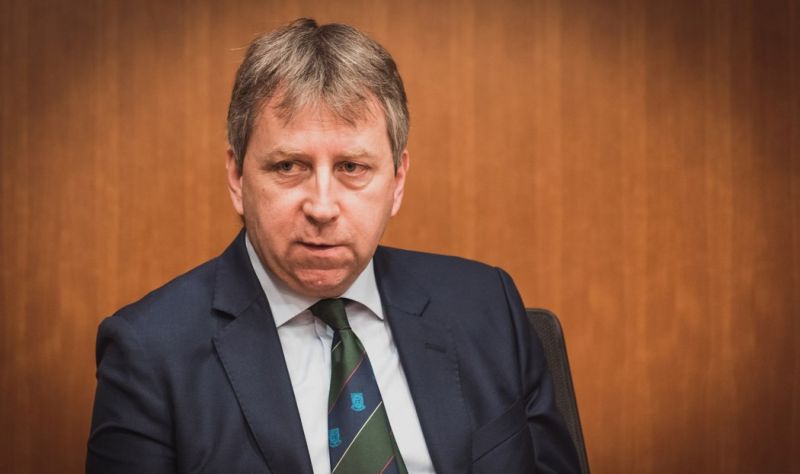
Ever since Mathieson took up HKU’s top job in 2014, both supporters and critics can agree that he has made gender equality a top institutional priority. So far HKU has, by its own account, joined an international women’s rights movement, amended hiring processes to include more women, and boosted the profile of gender studies research.
But now, with the surprise announcement that Mathieson will leave HKU next January, that agenda is thrown into doubt. What will be the future of gender equality at HKU? How does Mathieson view his legacy, and how does he plan for it to endure?
See also: University of Hong Kong chief Peter Mathieson denies early resignation is linked to school politics
When he first arrived in Hong Kong as a largely unknown figure, Mathieson was described – not at all kindly – as an “administrator” who just wanted to get the job done. And indeed, even now, even for a cause dear to his heart, he comes across less as a visionary than as a man who is keenly aware of his limitations.
“The raising of awareness, and the increased information flow, that kind of thing is all very well,” he says. “But what has it actually led to in terms of change?”
At his office atop the Knowles Building, Mathieson speaks more loosely, more candidly than in his usual public appearances. But true to character, he offers a cautious appraisal. “In terms of messaging, I think we’re quite successful. In terms of actually changing things, and in terms of making a substantial difference, I’m not so sure.”
HeForShe at HKU
On April 10th 2015, roughly a year into Mathieson’s tenure, HKU became the first university – not just in Hong Kong or Asia, but in the world – to join HeForShe.
Best known for having Emma Watson as its goodwill ambassador, UN Women’s HeForShe initiative is a “solidarity movement for gender equality” which, notably, calls for men’s active involvement. After it was launched in 2014, HKU quickly accepted an invitation to be one of 10 IMPACT Universities, with Mathieson as a figurehead.
This was Mathieson’s first high-profile gesture in support of gender equality, and in the two years since, it has almost become his signature policy. The initiative is so commonly associated with him, in fact, that when he announced his resignation, former student union president Billy Fung Jing-en said he “didn’t know what Mathieson did except HeForShe.”
See also: HKFP Interview – HKU ‘whistleblower’ Billy Fung on the HKU Council, Student Union, HKFS and more
“When I first got the university involved in HeForShe, the thing I became aware of quite quickly is people saying, ‘So what? What is it really going to mean?’ And I think that’s a perfectly reasonable question,” Mathieson says.
“The reason for signing up to HeForShe wasn’t that I thought it was perfect, or that it gave all the answers – I just thought it would help,” he says. “It struck me as a vehicle that would help us to do something we wanted to do anyway.”
In operation, HeForShe influences HKU policy indirectly through a number of IMPACT commitments proposed by Mathieson himself. UN Women requires participating institutions to report annually on their progress, and last September HKU presented its numbers for the first time, numbers which Mathieson says are “not very complimentary.”

Responding to the criticism that the initiative patronises women, Mathieson says that the HeForShe ethos is not about having men solve everything, but “getting men to recognise their responsibilities.” Since men are part of the problem, he says, men must also be involved in the solution. As for the charge that HeForShe is Eurocentric, Mathieson says he would support a homegrown gender equality program, but there is no good local alternative.
Steven Cannon, HKU’s executive vice-president for administration and finance, is the university’s representative on the HeForShe Steering Committee for the Impact Champions – basically HKU’s second-in-command for all things HeForShe. However, unlike Mathieson, Cannon says he is more sceptical.
“Whether the 10 by 10 by 10 concept is the vehicle for delivering [gender equality], I think I have some questions,” he says, referring to the HeForShe IMPACT 10 x 10 x 10 platform where Mathieson serves as one of 10 University IMPACT Champions. “I understand the premise behind it, but I just don’t know how sustainable the initiative is.”
Cannon maintains he is dedicated to the idea of gender equality, but observes that HeForShe’s global numbers are plateauing, a possible sign that it is “running out of steam.” One of Cannon’s biggest fears is that HeForShe is preaching to the converted, which he says is in danger of happening at HKU.
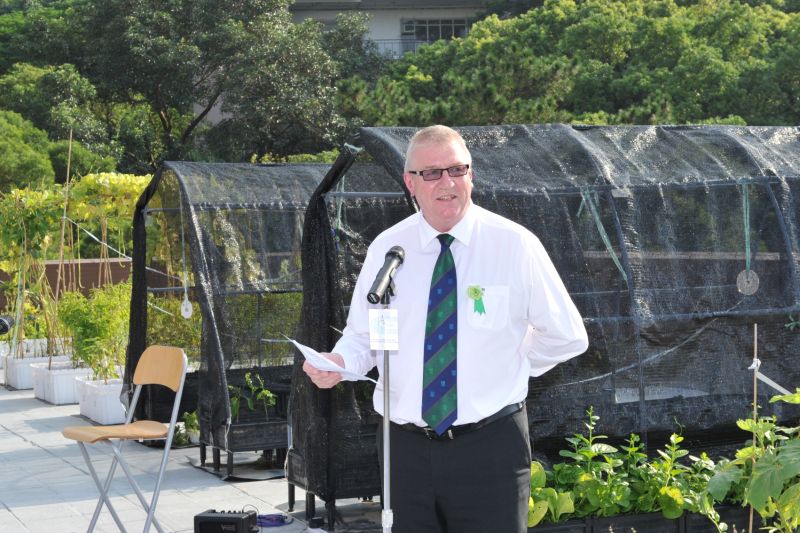
“We’ve probably touched those students who we’re going to touch, and it’s not going much beyond them. And likewise, even on the staff side, it tends to be the same people that turn up to the same events,” he says. “If it has to be driven by the centre all the time, then it won’t self sustain.”
The strongest internal opposition to HeForShe has come from the university’s student union, HKUSU. On February 6, it issued a declaration in response to Mathieson’s resignation, stating:
“As an important member of the senior management team, [Mathieson’s] performance is equally unsatisfactory… When launching the HeForShe campaign for gender equality… His measures steer away from the original principles: he demanded that the search committee must include female candidates for positions on the senior management team, violating the basic principle of meritocracy.”
Mathieson says he has not heard of this particular criticism from the HKUSU, and he “would debate that with them.” He is unsure why the HKUSU would take issue at all: since the status quo is not meritocratic, he says, there is no meritocracy to preserve. Nevertheless, he admits he did not consult students on changing the staffing arrangements, noting, “I’ve just tended to assume it’s quite hard to argue against.”
The HKUSU declined to comment for this article despite multiple requests.
Mathieson’s departure: What’s next?
Mathieson, for one, is now trying hard to dilute the impression which he spent two years building: that he is the prime mover of HKU’s gender equality agenda.
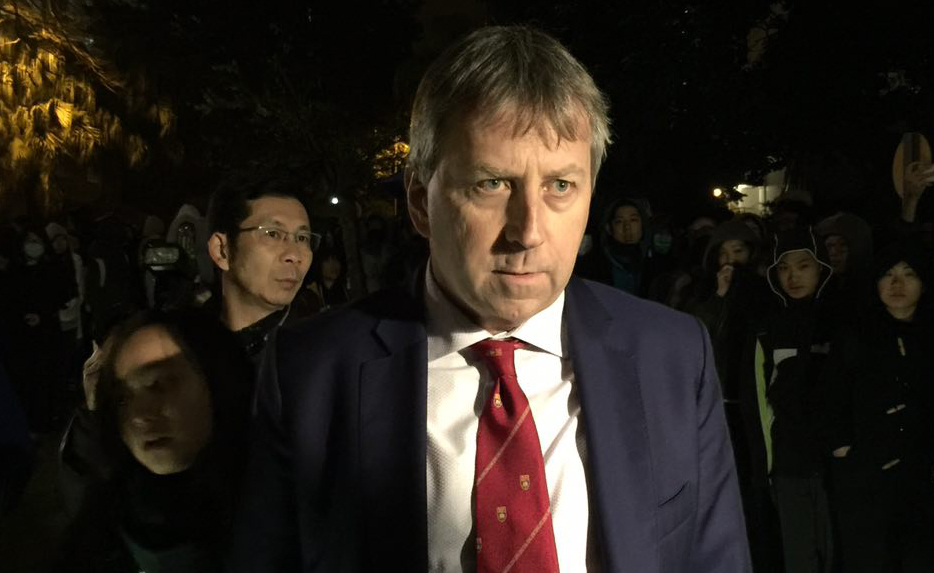
“What is going to happen when I leave? If the next president is somebody who doesn’t have the enthusiasm for this that I have, what will happen? My view is, quite a lot of things we’ve put in place are irreversible,” Mathieson says.
“It seems unlikely to me that the next president will come in and say, I think equal opportunities is a bad idea, I think gender equity is a bad idea,” he adds. “I can’t see why anyone would do that, because I think they would be wrong, and it would be a very controversial position to take.”
See also: Outgoing HKU chief Mathieson hails freedom of speech amid fears of ‘politicised’ succession
Even so, Mathieson concedes the next president likely won’t “want to make as much of an effort in this direction,” especially given the tendency for new presidents to signal changes in focus. (When asked about whether he prefers a woman to be his successor, Mathieson says it would be “terrific” but the choice is not up to him.)
“My job in my remaining time here, and the job of other colleagues who have worked with me on this, is to make sure these things remain part of the fabric of HKU, and that’s the only way we will achieve culture change,” Mathieson says.
When Mathieson leaves next January, much of HeForShe’s day-to-day work will be continued by HKU’s current senior management team. If there is a new male president by then, the designation of IMPACT Champion will pass to him. If the new president is a woman or if no new appointment is made, Cannon says he will pick up the role – at least temporarily.

HKU’s senior management team is made up of 10 top administrators, and Mathieson says the group leans toward supporting HeForShe, with varying degrees of enthusiasm. “I’m not going to name names, but there are some senior people in the organisation that I consider I’ve moved from the middle group into the enthusiast group,” he says.
Terry Au Kit-fong was appointed last May to be HKU’s vice-president of academic staffing and resources. As the highest-ranking female administrator in HKU, Au is convinced that the momentum will persist, and indeed she considers it part of her personal agenda.
“I feel we cannot be that passive, to expect Peter to stay here for another ten years to lead HeForShe. Peter has already led HKU to take the first step, which is an important step. If we don’t do this after Peter leaves, then it shows our hearts are not really in this at all,” she says.
See also: HKU appoints psychology prof Terry Au as pro-vice-chancellor following governing council debacle
She believes that the positive effects of female-friendly policies on research and funding will seen within the next five years, which can reassure critics that HeForShe is not Mathieson’s white elephant. Regarding the senior management team, Au, one of its two female members, thinks its attitude towards gender equality is positive, but not without room for improvement.
“I don’t feel any pushback, but sometimes [the other team members] may not be that aware, and then I will speak up,” she says. “When it comes to proposing a gender parity measure, they may not have thought of it before, but once I brought it up, they would usually agree it was reasonable.”
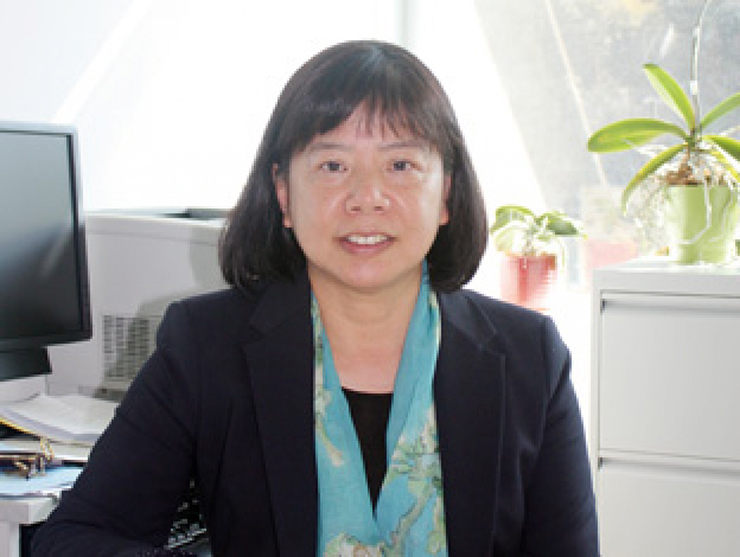
Au’s office also coordinates and funds student-led HeForShe activities, which currently involve about 30 active students. Young and somewhat loosely organised, the student group was formed last August and has since hosted a yoga event and a movie screening. It is not yet established in any official capacity.
Au, too, is aware that student enthusiasm is limited, which she considers to be the main challenge at HKU. “When I first became vice-president, I met student representatives and told them about my plans. One of them said, ‘Maybe this is a problem in Afghanistan or Pakistan where women can’t go to school, but HKU doesn’t have a problem with gender equity, so I feel you shouldn’t waste time on this.’”
‘So far so good’
On gender equality Mathieson prefers not to use the term “achievements,” but occasionally he allows himself some measure of satisfaction.
“When we make management decisions and policies, when we look at events, there are much more obvious efforts being made towards equal opportunity than there were during my first year, and I take some satisfaction from that,” he said.
His own summary for the whole enterprise is: “so far so good.” And yet, there remain frustrations which, at this point, seem unlikely to be resolved during his time in office.
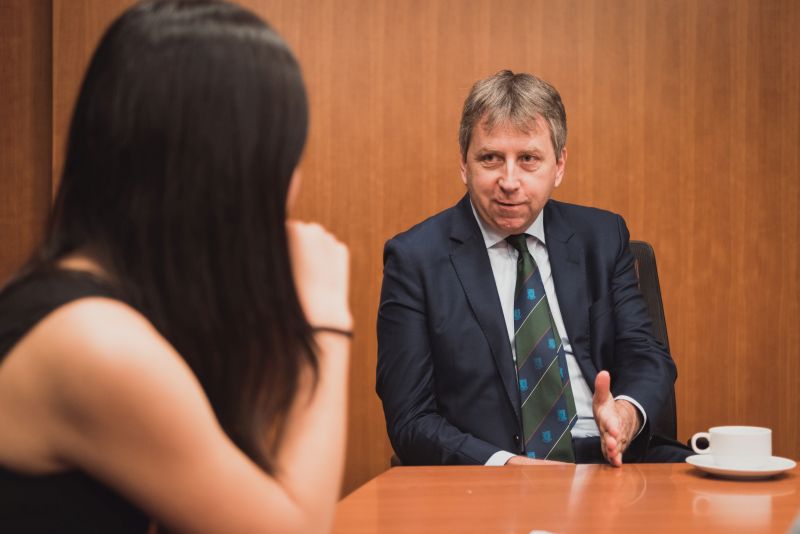
Regarding HKU’s new policy of including at least one woman on selection panels and committees, Mathieson states, unequivocally, that it is not aggressive enough. He also thinks the Research Grants Council’s policy of not allowing part-time staff to be lead researchers disproportionately affects women, but his attempts to persuade the RGC were “without much success.” And the list goes on.
So how much is done, and how much is still left to do?
“If you push me on a percentage, I would say something around 10 per cent of what needs to be achieved,” Mathieson says, ruefully.
“We’re miles from having achieved anything very substantial.”
This article originally appeared on HKUDOS, a University of Hong Kong student magazine.
